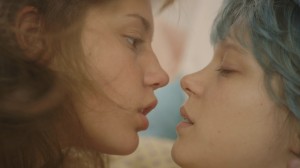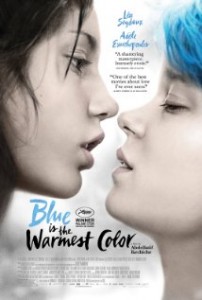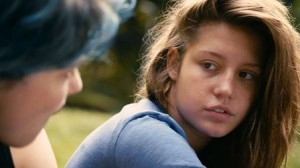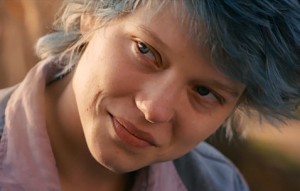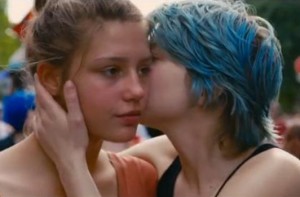Blue Is the Warmest Colour (La vie d’Adèle) – Film Review
The original French title is the much more ordinary La vie d’Adèle and that’s exactly what we get. The young life of Adèle (Adèle Exarchopoulos) is changed dramatically for ever when she meets the charismatic, alluring Emma (Léa Seydoux), an older, more sophisticated lesbian with blue hair, who brings her out of the closet sexually, mentally and socially.
This heated, passionate lesbian love epic runs 180 minutes and includes extended sex sequences that leave nothing to the imagination. It’s a sweaty emotional and sexual marathon.
It’s also an astonishingly good film, deserving its Cannes Palme d’Or prize that was uniquely shared between the writer-director Abdellatif Kechiche and the two stars. It is the first time ever the prize was also officially awarded to two of the actors. And you can see why. They’re stupendous. They’re the making of the film. They are perfectly cast. They are perfect. They are the film.
They seem so ‘real’ you can’t believe they’re acting at all, even with the camera exploring every bit of the their faces and bodies. Certainly they have no place to hide. So everything little thing they do has to be right for the film to work, and it is.
We first find Adèle trying to have a relationship with a nice boy. But that doesn’t work out for her and she pretty near breaks his heart when she breaks up with him. The arrival of Emma in her life changes everything. She awakens and blossoms as a woman, as a sexual being, as a member of society, as an adult. But this turns out not really to be a love affair after all.
Though it doesn’t seem like it for so long, Emma is essentially as uncommitted to Adèle as Adèle was to the boy. Emma is going to pretty near break Adèle’s heart too, but that’s not the story. For eventually, after being released from Emma’s power, Adèle truly finds herself. And that’s the story.
There’s been some criticism that a man, Kechiche, has made this movie at all and in this way. He films meticulously, naturalistically and truthfully. Blue Is the Warmest Colour is voyeuristic, no doubt about it. The sex is filmed with a documentary realism that’s even a bit shocking. Is it the extreme close-ups or just the length of the sex scenes that takes you by surprise? Best to sit back and enjoy them.
But, voyeuristic as it is, the film is incredibly honest, involving, enjoyable and moving too.
It won the London, Los Angeles, San Francisco and New York Film Critics Awards for Best Foreign Language Film.
(C) Derek Winnert 2013 derkwinnert.com

